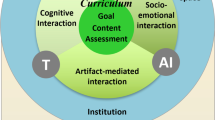Abstract
Since education is a major step toward long-term human capital development, it is assumed that facility in the use of information and communication technology (ICT), which can help complement, enrich, and transform education, should be promoted among students. However, does a higher level of ICT familiarity always help promote learning skills and educational outcome? This empirical research paper investigates the impacts of ICT familiarity on educational outcomes in developing countries where access to ICT infrastructure is limited. Using Thailand as a case study of a developing country, a nationally representative survey of 8249 students from the Programme for International Student Assessment (PISA) in Thailand was analyzed. Our results show that using ICT for educational proposes can help improve Thai students’ PISA scores. However, using ICT that is not tailored to educational proposes is found to have an insignificant effect on educational outcomes. This result supports government, related agencies, and families in their efforts to foster children’s use of ICT to enhance their education, but suggests limiting such usage for non-educational proposes.




Similar content being viewed by others
References
Adam, T., & Tatnall, A. (2017). The value of using ICT in the education of school students with learning difficulties. Education and Information Technologies, 22(6), 2711–2726.
Aypay, A. (2010). Information and communication technology (ICT) usage and achievement of Turkish students in PISA 2006. The Turkish Online Journal of Educational Technology, 9(2), 116–124.
Biagi, F., & Loi, M. (2013). Measuring ICT use and learning outcomes: Evidence from recent econometric studies. European Journal of Education Research, Development and Policy, 48(1), 23–42.
Bulut, O., & Cutumisu, M. (2017). When technology does not add up: ICT use negatively predicts mathematics and science achievement for Finnish and Turkish students in PISA 2012. Journal of Educational Multimedia and Hypermedia, 27(1), 25–42.
Delen, E., & Bulut, O. (2011). The relationship between students’ exposure to technology and their achievement in science and math. The Turkish Online Journal of Educational Technology, 10(3), 311–317.
Eickelmann, B., Gerick, J., & Koop, C. (2017). ICT use in mathematics lessons and the mathematics achievement of secondary school students by international comparison: Which role do School level factors play? Education and Information Technologies, 22(4), 1527–1551.
Fasih, T. (2008). Linking education policy to labor market outcomes. The World Bank: Washington D.C.
Ilomäki, L., Paavola, S., Lakkala, M., & Kantosalo, A. (2016). Digital competence – An emergent boundary concept for policy and educational research. Education and Information Technologies, 21(3), 655–679.
Kingsley, A. (2017). Information communication technology (ICT) in the educational system of the third world countries as a pivotal to meet global best practice in teaching and development. American Journal of Computer Science and Information Technology, 5(2). https://doi.org/10.21767/2349-3917.100010 retrieved from http://www.imedpub.com/articles/information-communication-technology-ict-in-the-educational-system-of-thethird-world-countries-as-a-pivotal-to-meet-global-best-pr.php?aid=21571.
Kubiatko, M., & Vickova, K. (2010). The relationship between ICT use and science knowledge for Czech students: A secondary analysis of PISA 2006. International Journal of Science and Mathematics Education, 8(3), 523–543.
Leino, K. (2014). The Relationship between ICT Use and Reading Literacy: Focus On 15-year-old Finnish Students in PISA Studies, Finnish Institute for Education Research. Jyväskylä: Jyväskylä University Press.
Luu, K., & Freeman, J. G. (2011). An analysis of the relationship between information and communication technology (ICT) and scientific literacy in Canada and Australia. Journal of Computers & Education, 56(4), 1072–1082.
Oliver, R. (2002). The Role of ICT in Higher Education for the 21st century: ICT as a Change Agent for Education, retrieved from http://citeseerx.ist.psu.edu/viewdoc/download?doi=10.1.1.83.9509&rep=rep1&type=pdf
Petko, D., Cantieni, A., & Prasse, D. (2017). Perceived quality of educational technology matters: A secondary analysis of Students' ICT use, ICT-related attitudes, and PISA 2012 test scores. Journal of Educational Computing Research, 54(8), 1070–1091.
Shields, R. & Chugh, R. (2018). Preparing Australian High School Learners with 21st Century Skills. 2018 IEEE International Conference on Teaching, Assessment, and Learning for Engineering (TALE), Wollongong, NSW, 2018, pp. 1101–1106. https://doi.org/10.1109/TALE.2018.8615207.
Suryani, A. (2010). ICT in education: Its benefits, difficulties, and organizational development issues. Journal of Social Sciences and Humanities, 3(1), 106–123.
Thomson, S. & De Bortoli, L. (2007). PISA 2003 Australia: ICT Use and Familiarity at School and Home, ACER Research Monograph No 62, Australian Council for Educational Research.
Wittwer and Senkbeil (2008) in reference listWittwer, J. and Senkbeil, M. 2008. Is students' computer used at home related to their mathematical performance at school?, Computers & Education, 50(4): 1558-1571.
Zhang, D., & Liu, L. (2016). How does ICT use influence students’ achievements in math and science over time? Evidence from PISA 2000 to 2012. Eurasia Journal of Mathematics Science & Technology Education, 12(9), 2431–2449.
Author information
Authors and Affiliations
Corresponding author
Additional information
Publisher’s note
Springer Nature remains neutral with regard to jurisdictional claims in published maps and institutional affiliations.
Rights and permissions
About this article
Cite this article
Srijamdee, K., Pholphirul, P. Does ICT familiarity always help promote educational outcomes? Empirical evidence from PISA-Thailand. Educ Inf Technol 25, 2933–2970 (2020). https://doi.org/10.1007/s10639-019-10089-z
Received:
Accepted:
Published:
Issue Date:
DOI: https://doi.org/10.1007/s10639-019-10089-z




